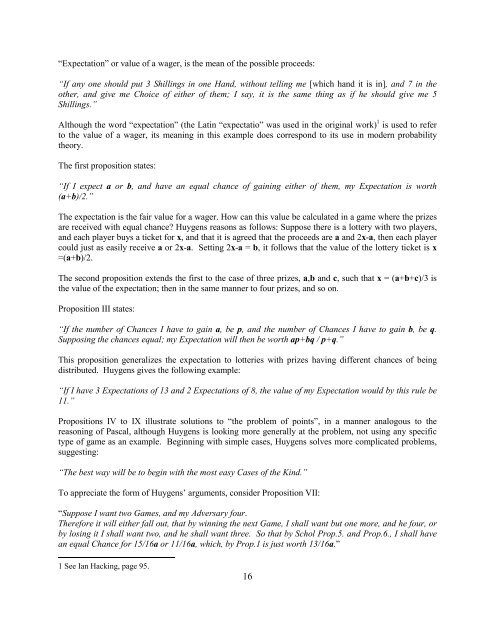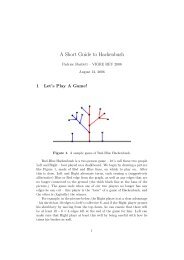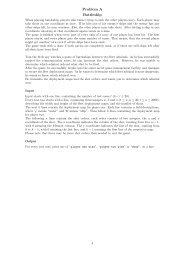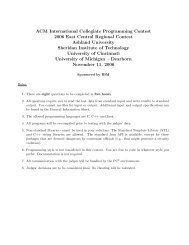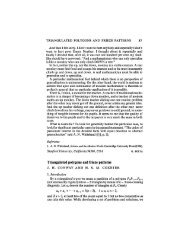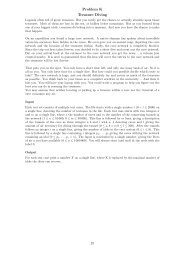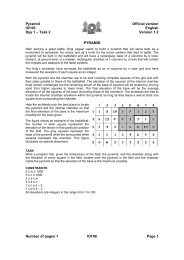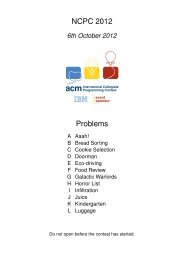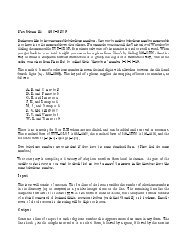Review1 of Liber De Ludo Aleae (Book on Games of Chance) by ...
Review1 of Liber De Ludo Aleae (Book on Games of Chance) by ...
Review1 of Liber De Ludo Aleae (Book on Games of Chance) by ...
Create successful ePaper yourself
Turn your PDF publications into a flip-book with our unique Google optimized e-Paper software.
“Expectati<strong>on</strong>” or value <str<strong>on</strong>g>of</str<strong>on</strong>g> a wager, is the mean <str<strong>on</strong>g>of</str<strong>on</strong>g> the possible proceeds:<br />
“If any <strong>on</strong>e should put 3 Shillings in <strong>on</strong>e Hand, without telling me [which hand it is in], and 7 in the<br />
other, and give me Choice <str<strong>on</strong>g>of</str<strong>on</strong>g> either <str<strong>on</strong>g>of</str<strong>on</strong>g> them; I say, it is the same thing as if he should give me 5<br />
Shillings.”<br />
Although the word “expectati<strong>on</strong>” (the Latin “expectatio” was used in the original work) 1 is used to refer<br />
to the value <str<strong>on</strong>g>of</str<strong>on</strong>g> a wager, its meaning in this example does corresp<strong>on</strong>d to its use in modern probability<br />
theory.<br />
The first propositi<strong>on</strong> states:<br />
“If I expect a or b, and have an equal chance <str<strong>on</strong>g>of</str<strong>on</strong>g> gaining either <str<strong>on</strong>g>of</str<strong>on</strong>g> them, my Expectati<strong>on</strong> is worth<br />
(a+b)/2.”<br />
The expectati<strong>on</strong> is the fair value for a wager. How can this value be calculated in a game where the prizes<br />
are received with equal chance? Huygens reas<strong>on</strong>s as follows: Suppose there is a lottery with two players,<br />
and each player buys a ticket for x, and that it is agreed that the proceeds are a and 2x-a, then each player<br />
could just as easily receive a or 2x-a. Setting 2x-a = b, it follows that the value <str<strong>on</strong>g>of</str<strong>on</strong>g> the lottery ticket is x<br />
=(a+b)/2.<br />
The sec<strong>on</strong>d propositi<strong>on</strong> extends the first to the case <str<strong>on</strong>g>of</str<strong>on</strong>g> three prizes, a,b and c, such that x = (a+b+c)/3 is<br />
the value <str<strong>on</strong>g>of</str<strong>on</strong>g> the expectati<strong>on</strong>; then in the same manner to four prizes, and so <strong>on</strong>.<br />
Propositi<strong>on</strong> III states:<br />
“If the number <str<strong>on</strong>g>of</str<strong>on</strong>g> <strong>Chance</strong>s I have to gain a, be p, and the number <str<strong>on</strong>g>of</str<strong>on</strong>g> <strong>Chance</strong>s I have to gain b, be q.<br />
Supposing the chances equal; my Expectati<strong>on</strong> will then be worth ap+bq / p+q.”<br />
This propositi<strong>on</strong> generalizes the expectati<strong>on</strong> to lotteries with prizes having different chances <str<strong>on</strong>g>of</str<strong>on</strong>g> being<br />
distributed. Huygens gives the following example:<br />
“If I have 3 Expectati<strong>on</strong>s <str<strong>on</strong>g>of</str<strong>on</strong>g> 13 and 2 Expectati<strong>on</strong>s <str<strong>on</strong>g>of</str<strong>on</strong>g> 8, the value <str<strong>on</strong>g>of</str<strong>on</strong>g> my Expectati<strong>on</strong> would <strong>by</strong> this rule be<br />
11.”<br />
Propositi<strong>on</strong>s IV to IX illustrate soluti<strong>on</strong>s to “the problem <str<strong>on</strong>g>of</str<strong>on</strong>g> points”, in a manner analogous to the<br />
reas<strong>on</strong>ing <str<strong>on</strong>g>of</str<strong>on</strong>g> Pascal, although Huygens is looking more generally at the problem, not using any specific<br />
type <str<strong>on</strong>g>of</str<strong>on</strong>g> game as an example. Beginning with simple cases, Huygens solves more complicated problems,<br />
suggesting:<br />
“The best way will be to begin with the most easy Cases <str<strong>on</strong>g>of</str<strong>on</strong>g> the Kind.”<br />
To appreciate the form <str<strong>on</strong>g>of</str<strong>on</strong>g> Huygens’ arguments, c<strong>on</strong>sider Propositi<strong>on</strong> VII:<br />
“Suppose I want two <strong>Games</strong>, and my Adversary four.<br />
Therefore it will either fall out, that <strong>by</strong> winning the next Game, I shall want but <strong>on</strong>e more, and he four, or<br />
<strong>by</strong> losing it I shall want two, and he shall want three. So that <strong>by</strong> Schol Prop.5. and Prop.6., I shall have<br />
an equal <strong>Chance</strong> for 15/16a or 11/16a, which, <strong>by</strong> Prop.1 is just worth 13/16a.”<br />
1 See Ian Hacking, page 95.<br />
16


